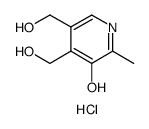Pyridoxine-d5 hydrochloride
Modify Date: 2024-01-14 19:49:54

Pyridoxine-d5 hydrochloride structure
|
Common Name | Pyridoxine-d5 hydrochloride | ||
|---|---|---|---|---|
| CAS Number | 82896-38-6 | Molecular Weight | 205.63900 | |
| Density | N/A | Boiling Point | N/A | |
| Molecular Formula | C8H12ClNO3 | Melting Point | N/A | |
| MSDS | N/A | Flash Point | N/A | |
Use of Pyridoxine-d5 hydrochloridePyridoxine-d5 (hydrochloride) is the deuterium labeled Pyridoxine hydrochloride[1]. Pyridoxine hydrochloride (Pyridoxol;Vitamin B6) is a pyridine derivative. Pyridoxine (Pyridoxol;Vitamin B6) exerts antioxidant effects in cell model of Alzheimer's disease via the Nrf-2/HO-1 pathway[2]. |
| Name | 3,4-Pyridinedimethan-α3,α3-d2-ol, 5-hydroxy-6-(methyl-d3)-, hydrochloride |
|---|---|
| Synonym | More Synonyms |
| Description | Pyridoxine-d5 (hydrochloride) is the deuterium labeled Pyridoxine hydrochloride[1]. Pyridoxine hydrochloride (Pyridoxol;Vitamin B6) is a pyridine derivative. Pyridoxine (Pyridoxol;Vitamin B6) exerts antioxidant effects in cell model of Alzheimer's disease via the Nrf-2/HO-1 pathway[2]. |
|---|---|
| Related Catalog | |
| In Vitro | Stable heavy isotopes of hydrogen, carbon, and other elements have been incorporated into drug molecules, largely as tracers for quantitation during the drug development process. Deuteration has gained attention because of its potential to affect the pharmacokinetic and metabolic profiles of drugs[1]. |
| References |
| Molecular Formula | C8H12ClNO3 |
|---|---|
| Molecular Weight | 205.63900 |
| Exact Mass | 205.05100 |
| PSA | 73.58000 |
| LogP | 0.88220 |
| Pyridoxine Hydrochloride D5 |